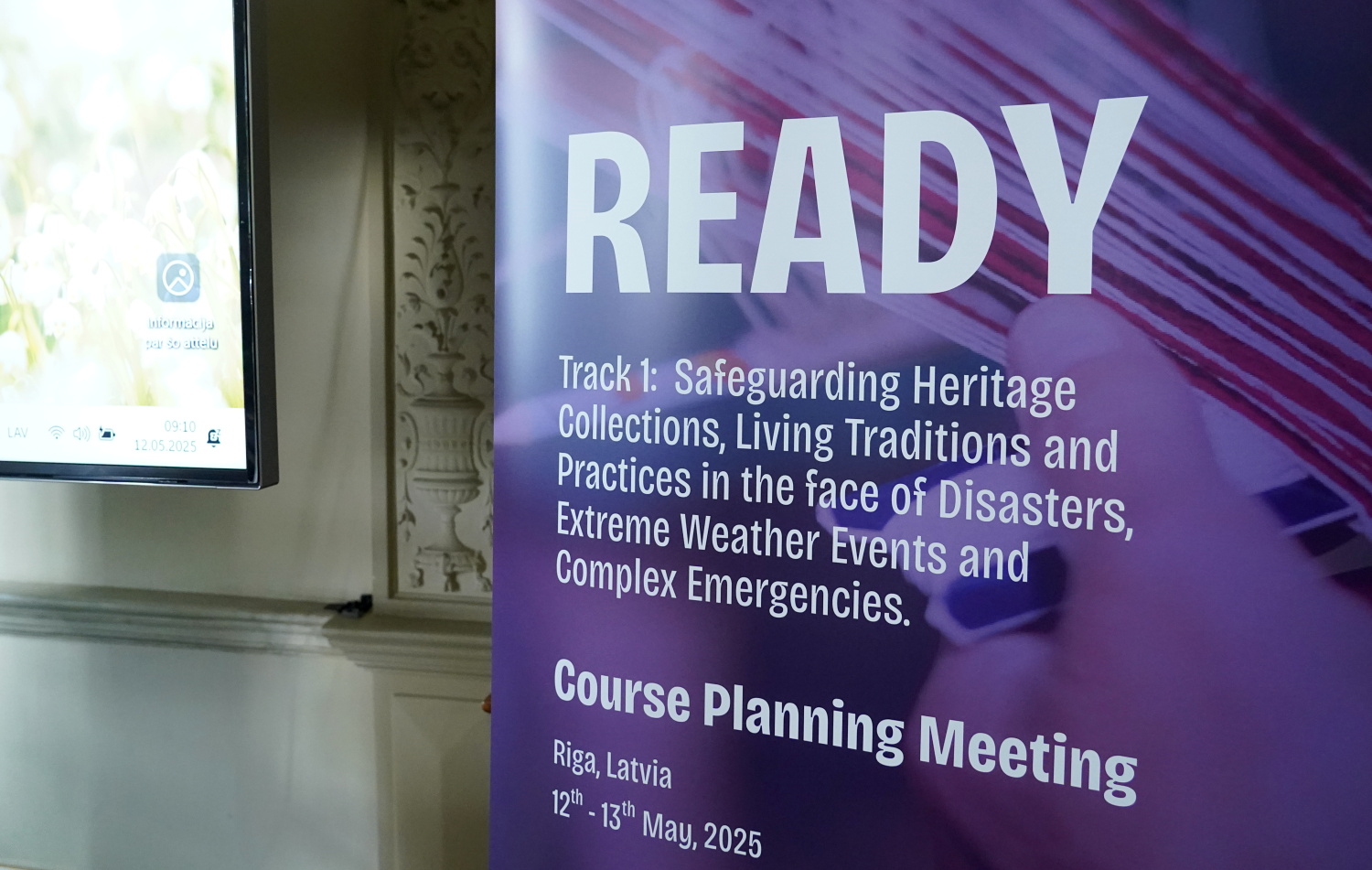PRESS RELEASE
Leading Experts Gather in Riga to Launch First Phase of the READY Project
Riga, 14 May 2025 - From 12 to 14 May, the Ministry of Culture of Latvia and ICCROM (International Centre for the Study of the Preservation and Restoration of Cultural Property), in cooperation with the European Commission’s Directorate General for Education, Youth, Culture and Sport (DG EAC), are hosting a high-level expert meeting in Riga to mark the launch of the first phase of the READY project (Safeguarding Cultural Heritage from Disasters, Extreme Weather Events, and Complex Emergencies).
This launch marks the beginning of READY Track 1 – Safeguarding Heritage Collections, Living Traditions and Practices in the Face of Disasters, Extreme Weather Events, and Complex Emergencies.
The READY project is a 38-month initiative, funded by the European Union through the Creative Europe programme and implemented by ICCROM through its First Aid and Resilience for Cultural Heritage in Times of Crisis (FAR) programme. It aims to enhance Europe’s ability to safeguard all forms of cultural heritage from intensifying threats such as climate change-induced hazards, disasters, and complex emergencies.
Latvia, through its Ministry of Culture, is playing a key role in this effort by hosting and supporting the in-person component of Track 1 training. Beginning mid-July 2025, more than 25 heritage and risk management professionals from across Europe will convene in Riga for a 12-day hands-on course. The training will equip participants with practical skills to assess risks, implement emergency preparedness, and develop context-specific strategies to protect heritage collections and living traditions in times of crisis.
The Riga expert meeting serves as a key milestone in shaping the in-person training phase of READY Track 1. It brings together a distinguished group of international specialists, including representatives from cultural institutions, academic and research organizations, civil protection agencies, international bodies, and civil society. Among the participants are leading experts in heritage protection, climate resilience, disaster risk reduction, and community engagement, working collaboratively to co-develop a comprehensive and context-specific training agenda tailored to the needs of Creative Europe countries.
Funded by the European Union through the Creative Europe programme, the READY project is implemented by ICCROM in partnership with leading institutions from Latvia, Ukraine, France, Cyprus, Spain, Croatia, Poland, Portugal, Romania, Italy, and Belgium.
Its three core objectives are:
- Developing capacities among professionals and communities to proactively manage extreme risks to protect cultural heritage;
- Engaging communities to strengthen social cohesion and resilience; and
- Integrating heritage protection into disaster risk management and climate adaptation planning.
This initiative holds particular significance for Latvia, which earlier this year adopted a national plan for the protection of cultural heritage in crisis situations – a clear demonstration of its commitment to integrate cultural heritage into broader national preparedness and response strategies. The READY project also marks a notable innovation in its emphasis on living heritage and community-based disaster–risk management, recognizing the vital role of living heritage and local knowledge in withstanding and recovering from crises.
Ms Dace Vilsone, State Secretary for Culture of the Republic of Latvia, stated:
“This meeting reflects our firm commitment to making cultural heritage protection an integral part of national preparedness. We are honoured to host such a distinguished group of experts and to contribute to strengthening Europe’s collective resilience through culture. The focus on intangible heritage and community engagement is especially meaningful for us.”
Ms Aruna Francesca Maria Gujral, Director-General of ICCROM, emphasized:
“ I sincerely thank the Ministry of Culture of the Republic of Latvia for their strong commitment to this initiative and for bringing us together to begin this important work. READY’s strength lies in the collective dedication, expertise, and shared vision of the individuals and organizations involved. This is a partnership that transcends borders and disciplines—a partnership that will shape the future of cultural heritage preservation.”
READY Track 1 will continue with online foundational training sessions in May–June 2025 and hands-on field projects from July 2025 to February 2026. The broader READY initiative will culminate in an international conference and open-access publication showcasing tools, field-tested approaches, and policy insights to inform disaster risk management and climate adaptation for cultural heritage.
For media inquiries, please contact:
Ministry of Culture of the Republic of Latvia
Lita Kokale, Head of public relations
+371 26469946
ICCROM
Jennifer Copithorne, Partnership and Communication Manager
About ICCROM
ICCROM is an Intergovernmental Organization working in service to its Member States to promote the conservation of all forms of cultural heritage in every region of the world. ICCROM has partnered with Member States for more than six decades to support them in safeguarding heritage within their borders and beyond. Working at the international and governmental levels, and with institutions and professionals on the ground, the Organization engages and informs new generations of professionals and the general public with an interest in heritage.
ICCROM – READY Project
READY – Resilience for Heritage in the Face of Disasters, Climate Risks and Complex Emergencies – is a groundbreaking initiative, funded by the European Union through the Creative Europe Programme, and implemented by ICCROM through its First Aid and Resilience for Cultural Heritage in Times of Crisis (FAR) programme in partnership with the European Commission's Directorate-General for Education, Youth, Sport and Culture (DG EAC) and more than 14 technical partners. The project aims to strengthen capacities to protect all forms of heritage from extreme risks, including climate change-driven disasters and armed conflicts, in Europe and beyond.

